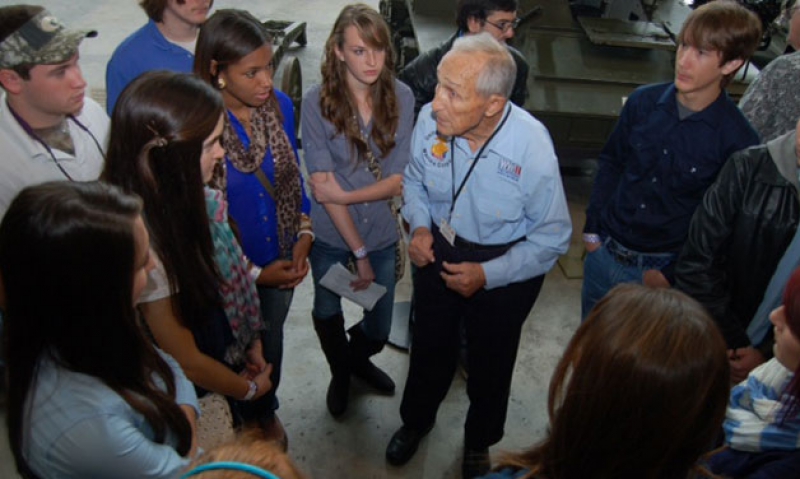
National World War II Museum ceremony pays tribute to the attack’s 71st anniversary.
Wide-eyed high school students from Vancleave, Miss., circled 93-year-old Pearl Harbor veteran Bert Stolier of New Orleans Friday and listened to stories of torpedo-bombing Japanese planes and U.S. sailors jumping to their deaths in the oily waters off Oahu, Hawaii, on Dec. 7, 1941.
"It’s very important that they understand what kind of forefathers they had," explained Stolier, one of 26 National World War II Museum volunteers who provide for visitors firsthand accounts of the war they helped win. "They were men. There was no such thing as can’t-do. We had a job to do, and we did it."
The museum commemorated the 71st anniversary of the Pearl Harbor attack with ceremonies that included patriotic music by kindergarten students of Sacred Heart Academy, a performance by the New Orleans Navy Band and remarks by Dr. Keith Huxen, director of research and history for the museum. American Legion Past National Commander William Detweiler, military affairs consultant for the museum, served as master of ceremonies.
"We always come together on this date to commemorate, not celebrate," he told a crowd at the museum. "Our job is to remember, for the purpose of preserving the freedoms we enjoy today."
Huxen reminded the crowd that before Dec. 7, 1941, America was at peace and held out hope that it would not need to enter the war. He said Japan’s goal was to demoralize the United States before it could mount any kind of military action against the Axis in the Pacific. "Not all nations answer the call when they are dealt such a blow," he said. "This is why Pearl Harbor is such a powerful beacon in our national memory. We did not give up."
The attack claimed the lives of 2,390 servicemembers and 49 civilians and thrust the United States into World War II.
Memories of the attack still haunt Bert Stolier. "I dream about it once a week," he said. "I can’t stop. It’s only been since my wife passed away that I have been talking about it. Now, what I am doing is for the good of these young people — letting them know what kind of nation they live in."
He said he realizes it is up to him and his fellow World War II veterans to share the story to new generations. Their ranks are thinning. "I started two weeks before this museum opened up, and we had over 300 veteran volunteers here then. We’re down to 26 now, and I’m one of them."
Jeanie Guillotte, a parent who traveled with the high school group from Mississippi, said what was meant as a field trip to help students better understand World War II before a state history exam next week turned out to be something more. "It almost brought tears to my eyes," she said. "Hearing the stories of what they went through, what the families went through. It’s fascinating."
"Dec. 7, 1941, changed the lives of millions of Americans," Huxen said, noting the importance of the attack cannot be lost on new generations. "It is why we give honor and remember today."
- Library & Museum

